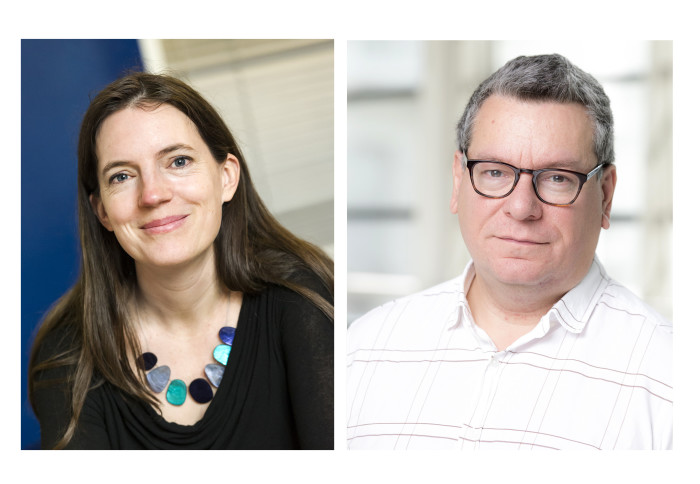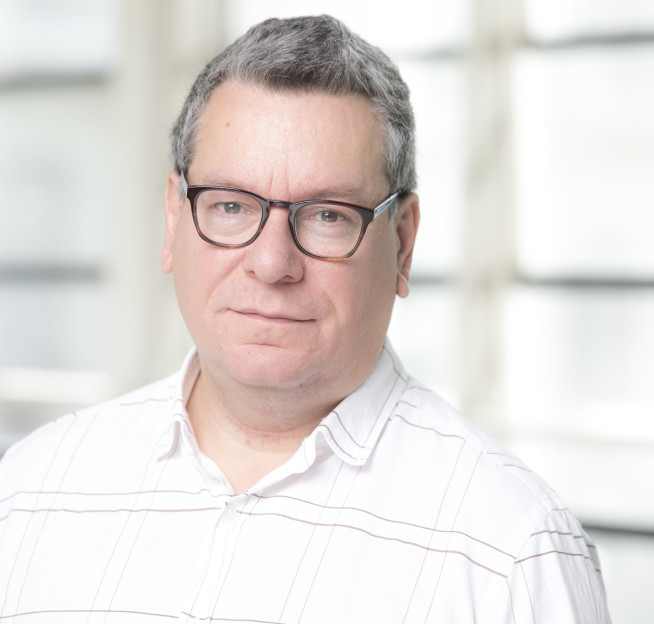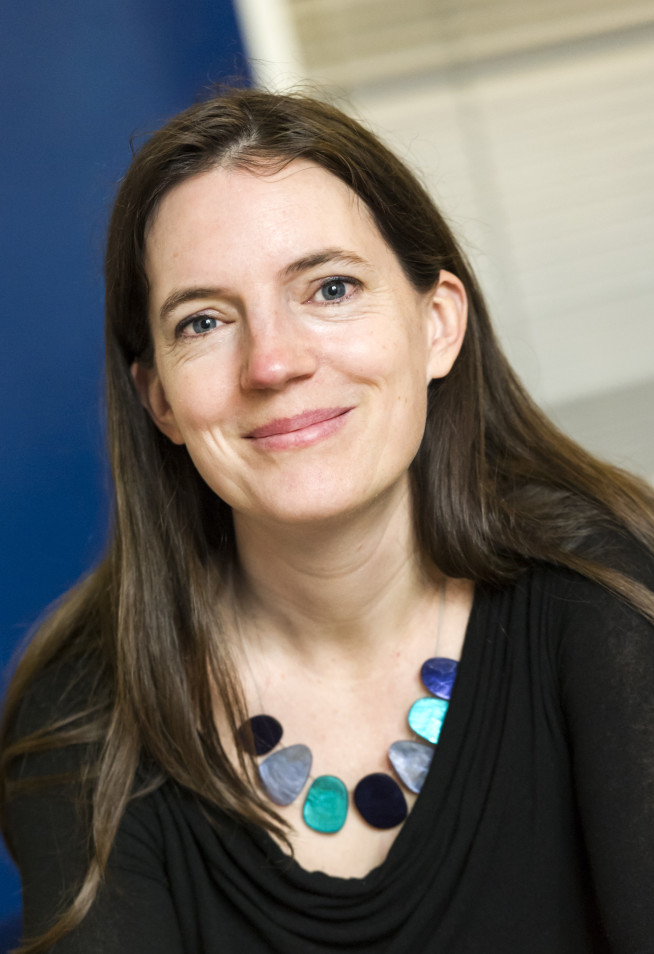Two Imperial ‘research visionaries’ win Academy Chairs in Emerging Technologies

The Royal Academy of Engineering has appointed two Imperial engineers as Chairs in Emerging Technologies.
Imperial College London Professors Emile Greenhalgh and Molly Stevens have been awarded the highly prestigious ten-year funding - given to global visionaries pioneering technologies that could have global benefits - for their work on energy materials and regenerative medicine respectively.
Our two new Chairs in Emerging Technologies are sure to bring their visionary technology to the forefront of society in the next ten years. Professor Nigel Brandon Dean, Faculty of Engineering
The appointments, each worth £2.7 million, bring the total number of Chairs at Imperial to six – the most Chairs of any UK university.
The Academy covers Chair recipients for employment and research costs to let them focus on developing new technologies that have high potential to deliver economic and social benefit to the UK.
Professor Nigel Brandon, Dean of the Faculty of Engineering, said: “From massless energy to regenerative medicine, our two new Chairs in Emerging Technologies are sure to bring their visionary technology to the forefront of society within the next ten years.
“That Imperial now holds the most Chairs in the UK is testament to the exceptional minds and real-world benefits brought to the world by our engineers.”
Professor Sir Jim McDonald, President of the Royal Academy of Engineering, said: “These visionary engineers and the projects they will be working on are outstanding examples of why the Academy places such importance on supporting excellence in engineering as part of its strategy to achieve a sustainable society and inclusive economy that works for everyone.”
Professor Emile S Greenhalgh: Massless energy

Professor Greenhalgh of the Department of Aeronautics has received the Chair for his project ‘Structural power and multifunctional structural materials’.
The Chair will enable Professor Greenhalgh to focus on developing structural power composites – mechanically load-bearing materials that can store and deliver electrical energy.
These multifunctional composites are a completely new way of using structural materials, heralding an emerging technology that could revolutionise sectors such as portable electronics, vehicles, aerospace, and infrastructure. If successful, such ‘massless energy’ could ultimately consign conventional batteries to history.
This advance in materials engineering will absolutely be at the heart of society as we seek to generate, store and consume energy differently. Professor Emile Greenhalgh Chair recipient
He said: “I am honoured to be given this exciting opportunity by the Academy to expand this technology further. Structural power has potential applications in anything that needs a battery, so the materials will be found in our phones, cars, computers, aircraft, medical devices and infrastructure. This advance in materials engineering will absolutely be at the heart of society as we seek to generate, store and consume energy differently.
“With this Chair I will advance the field by combining expertise and collaboration from fields as diverse as chemistry and aeronautics, and by nurturing close working relationships between academics and industry leaders.”
Professor Molly Stevens: Innovative biomedical materials

Professor Stevens of the Departments of Materials and Bioengineering has received the Chair for her project ‘Multidimensional Target-Agnostic Sensing (MTAS): the next generation of biosensors’
The Chair will enable Professor Stevens to focus on developing a range of new bioengineering technologies for strategies in biosensing.
Professor Stevens and her group aim to develop the next generation of technology platforms on which to achieve these goals, including a new MTAS platform which will enable longitudinal monitoring of patients and biotech processes over time.
The support will help us to develop completely new platforms that could revolutionise the way diseases are detected and treated. Professor Molly Stevens Chair recipient
Working closely with clinical and industrial partners, her multidisciplinary research will enable applications in diagnostics in point of care settings, profiling of diseases such as cancer and monitoring of biotech processes like gene therapy.
Professor Stevens said: “I am thrilled to receive this Chair in Emerging Technologies from the Academy. The support will help us to develop completely new platforms that could revolutionise the way diseases are detected and treated."
“This Chair will enable a close marriage between engineering, medicine, chemistry and big data to advance the field.”
What are our other Chairs up to?
Magda Titirici, Professor of Sustainable Energy Materials
My team and I have made significant progress towards developing high capacity anodes for more sustainable sodium- and potassium-ion batteries with superior performance to lithium-ion ones. Professor Magda Titirici Previous Chair recipient
Professor Titirici of the Department of Chemical Engineering received the Chair in 2019 for her project ‘Sustainable energy materials for emerging technologies’.
She is working to develop sustainable future energy technologies, particularly new kinds of batteries to replace lithium-ion ones, and clean and low-cost production of hydrogen from biomass or plastic waste and its use in fuel cells free from precious metals.
These technologies will enable greater use of renewable energy in the future, from providing storage and supply of energy for use with intermittent energy supply to producing customized compostable electronics.
Professor Titirici said: “Since receiving the Chair, my team and I have made significant progress towards developing high capacity anodes for more sustainable sodium- and potassium-ion batteries with superior performance to lithium-ion ones. Analyses show that our anodes can be commercialised at half the cost of anodes derived from synthetic graphite, which may be the future of lithium-ion batteries given the scarcity of natural graphite.
“We have also discovered a feasible way to produce green hydrogen gas from waste such as glycerol while co-producing high value chemicals of interest for pharmaceutical and cosmetic industries. The Chair allowed me to hire a commercialisation manager to catalyse the fundamental research discoveries made in my group into viable societal technologies.”
Guy-Bart Stan, Professor of BioSystems Engineering & Control
I have been working on equipping synthetic biology with systems and control engineering methods and technologies that will accelerate the design, optimisation, and realisation of reliable biosystems. Professor Guy-Bart Stan Previous Chair recipient
Professor Stan of the Department of Bioengineering received the Chair in 2019 for his project ‘Accelerating engineering biology: efficient engineering of reliable and high-performance biosystems’.
He uses systems and control engineering techniques to design and implement robust, high-performance biosystems that can perform tasks autonomously and reliably.
The resulting biomolecular and cellular systems will enable applications in biotechnology, sustainable manufacturing, next-generation therapeutics, and lifelong health and wellbeing, and will help to transform synthetic biology from an emerging technology to a mature engineering discipline.
Professor Stan said: “Since receiving the Chair, I have been working on equipping synthetic biology with systems and control engineering methods and technologies that will accelerate the design, optimisation, and realisation of reliable biosystems.
"My goal is to induce an exciting paradigm shift and a new way of working in engineering biology. Part of this is the recent Imperial-Riffyn partnership to establish the core of a digital backbone for laboratory automation, data analytics and improved scientific reproducibility and quality control in synthetic biology research and education.”
Yiannis Demiris, Professor of Human-Centred Robotics
We’ve been advancing the ways that robots can help their users, including enhanced mobility and activities of daily living. Professor Yiannis Demiris Previous Chair recipient
Professor Demiris of the Department of Electrical and Electronic Engineering received the Chair in 2018 for his project ‘Personal Assistive Robots’.
His research focuses on developing, implementing and validating artificial intelligence systems that will enable robots to help those who need physical, cognitive and social support, while intelligently adapting to meet the individual needs of each person.
A fundamental challenge in the field is to develop machine learning, computer vision and user modelling algorithms that adapt to the changes in motor and sensory function over a person’s lifetime, providing personalised lifelong assistance while maintaining privacy.
Professor Demiris is adapting his research to challenging healthcare scenarios including smart robots for children with disabilities and growing elderly population with activities of daily life.
He said: “Since receiving the Chair, my research team and I have been looking to new robot learning algorithms for understanding how we can personalise the assistance that robots provide to their users in ways that are transparent and explainable.
"Through a combination of eye gaze perception, human movement recognition, augmented reality and explainable shared control, we’ve been advancing the ways that robots can help their users, including enhanced mobility and activities of daily living."
Alessio Lomuscio, Professor of Logic for Multiagent Systems
My research group and I have developed methods for the automated verification and debugging of AI systems, including machine-learning based systems like AI-based perception systems. Professor Alessio Lomuscio Previous Chair recipient
Professor Lomuscio of the Department of Computing received the Chair in 2018 for his project ‘Trusted learning-based autonomous and robotic systems’.
His research focuses on developing verification techniques for autonomous systems and AI. Verification is vital for enabling safe deployment and widespread acceptance of AI, and regulatory policies are needed to certify autonomous and AI systems more generally.
Professor Lomuscio is developing underlying mathematical methods and building toolkits that can demonstrate the safety and reliability of forthcoming AI systems – including autonomous and robotic systems –built from machine learning techniques.
He said: “Since receiving the Chair, I have worked with colleagues in our Verification of Autonomous Systems research group to develop methods for the automated verification and debugging of AI systems, including machine learning-based systems like AI-based perception systems.
“We are presently enhancing existing methods and developing new ones to address the scalability needs of modern AI applications.”
Article text (excluding photos or graphics) © Imperial College London.
Photos and graphics subject to third party copyright used with permission or © Imperial College London.
Reporter
Caroline Brogan
Communications Division